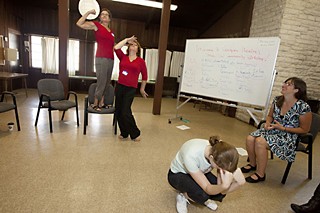The Uses of Joy
When Conspire Theatre helps incarcerated women, it's all in the game
By Katherine Catmull, Fri., Nov. 4, 2011
"In a very serious world, we must not forget the importance of play."
– Conspire Theatre's mission statement
I used to work in an office with a rule about when we could take lunch, which was a constant source of annoyance to me. What if I get busy and don't notice the time till 2pm? Get your laws off my ham sandwich, oppressor!
I would not do so well in prison. In the women's minimum security unit of the Travis County Correctional Complex in Del Valle, razor wire loops-the-loop along chain-link fences, keeping you in, keeping everything you love out. When prisoners walk between buildings, they must keep their hands behind their backs and stay just outside of one of the long red stripes painted on the sidewalk. And of course, that's the least of the structures and strictures of life for incarcerated women.
That's what makes what Conspire Theatre brings to the prison so odd.
It looks like a classroom, any classroom: cinder block walls, fluorescent lights, a whiteboard. (As we suspected in junior high: Classrooms and prisons have a lot in common.) Ten women enter, some in their 30s or 40s, most younger, all wearing prison uniforms of wide gray and khaki stripes. Prisoners still wear stripes – who knew.
The women from Conspire – one tall and grinning with long, dark hair; the other elfin and intense – begin the class. I've been asked to participate rather than just observe, and I had imagined tearful soul-probing as the incarcerated women work out their issues, enact a sort of Lifetime movie version of prisoners in an arts class.
But here's what actually happens: a bunch of goofy games. We toss a ball around; you have to say your name when it come to you (harder than it sounds!). We play Zip Zap Boing, which I can't even explain except to say that it's awfully easy to make a mistake, and it's hilarious when you do. We play a status game, chatting from either a cool and confident high status posture or a cringing low one. One woman simply can't drop to low status, but she's a master of high, using silence to reduce Kat Craft to helpless stuttering and laughter.
Craft is the tall one with the big smile, and she's Conspire's founder and executive director. When I told her my fantasy of the women tearing their hearts out in class and shaping them into a life-affirming whatever, she politely shot it down. For one thing, since the correctional complex is a county prison, most of the women in her classes are there for three or four weeks at most, waiting to be sentenced to state prison, working off a short sentence, or transferring between facilities. Consequently, "the group is different every time. So I have to make sure that each class is self-contained." The performances, which Craft tries to schedule every 10 weeks or so, are not plays as such but a loose collection of improvisations, poetry readings, and game demonstrations.
Craft acknowledges that some programs like hers do work with incarcerated women's real issues and stories. "But I've found other [programs that] work with 'What can you be in the future, and what are your possibilities?' So the way I think is based a lot on 'Let's look at the possibilities – let's look at opening up how we think about ourselves and what we're capable of doing.'"
And there's another reason that these classes don't play out my cheesy fantasy: respect. Craft says: "We want to honor what the women have been through and let them talk when they're comfortable talking – and if they want to, talk about what they're going through. And at the same time, we don't want to open up a bunch of stuff that we maybe can't close down. I always have been very wary of soliciting personal stories, because I think it's very easy to do that out of a kind of voyeuristic curiosity, which I want to avoid."
So what are the classes about then?
"I'm just big on playing games and joyfulness and laughter."
Uh, play, joyfulness, and laughter? What's the point of that? A few hours of silly theatre games over the course of a few weeks – what good could that possibly do a woman in prison?
That's what I was thinking, anyway, until I visited that class. I came out a believer, and for one reason: It was so ridiculously fun. We were in a prison, and we could not stop laughing. And something inside you just knows that is good for you – that it is essentially good for you.
The women Conspire serves seem to know it, too. Craft describes an exercise she once tried "where women create a character who could be in the class with them, and then they discuss, basically, how she got to jail, what happened to her. And we made it about two days through that workshop, and on day three, the women all came in and said: 'We have to talk to you.'"
Michelle Dahlenburg, Conspire's associate director, interjects: "'We've had a meeting.'"
Craft nods: "'We've had a meeting, and we're not doing this. This isn't what this class is about. We know why we're here, we know what we've done, we know all the shit that we have to deal with. This class is for reaching beyond.'"
Even though this story and my own experience told me that Conspire's focus on joy and play was essentially good in itself, I found some science to back me up – and a tragic, close-to-home example, too. In the late 1960s, Texas Gov. John Connally's Fact Finding Task Force for the Charles J. Whitman Texas Tower Case "unanimously identified [Whitman's] lifelong lack of play as a key factor in his homicidal actions" that led to 16 dead and twice as many injured. That's according to Stuart Brown, then a psychiatrist at Baylor University and a member of that task force. Now, on his National Institute for Play website, Brown writes, "A lifelong lack of play deprived [Whitman] of opportunities to view life with optimism, test alternatives, or learn the social skills that, as part of spontaneous play, prepare individuals to cope with life stress."
And here's Lauren Johnson, a formerly incarcerated woman and Conspire alum who now writes a blog for the company: As a substance abuser, "you begin to associate 'having fun' with usage of some sort. ... One of the reasons that what Conspire Theatre does is so important is that, whether or not they know it, these women are learning how to have fun."
Conspire's work is part of the prison's People Recognizing the Inherent Dignity of Everyone program. Jennifer Scott, the prison's social services coordinator, started PRIDE almost four years ago when she heard women express worry about how their incarceration was affecting their children, along with concerns about domestic violence and substance abuse. PRIDE's mission is "to assist incarcerated Travis County women in building stronger relationships with their children and families" in order to lessen "intergenerational incarceration." She invited groups like Goodwill and SafePlace to teach women skills and information they can take back out into the world.
Conspire joined the program two years ago, and it's been a great match from both perspectives. Craft praises Scott and Travis County Sheriff Greg Hamilton for offering a strong support system, while Scott lauds Conspire's "sense of teamwork and connection with the women. The number one thing that 98 percent of women have listed as challenging in the program is opening up and sharing with others. In Conspire, the women really open up and share in brand-new ways."
Craft founded Conspire, she says, because it "brings together my main passions: theatre, women's rights, and social justice." A playwright with local productions of her site-specific plays No One Else Will Ever Love You and The Story Seekers, she earned a master's degree in applied drama – which she defines as "theatre for social and educational and outreach," whether in hospitals, community centers, schools, or other settings – at Goldsmiths University of London.
"My professor's research specialty was theatre with incarcerated women," she recalls. "People talk about a calling – not to get too religious or self-important about it, but I had that kind of energy in class that day. I still have a hard time sitting still when I read about really good programs for incarcerated women or read about social justice issues facing women during and post-incarceration."
That passion for her work is clear. "These people are going to be released. Just because someone is incarcerated doesn't mean that they've gone away forever," she says. "How can we change it so that people aren't coming out angrier and more broken or broken if they weren't?"
Her program has earned praise from the women it serves. According to Scott, incarcerated women have described Craft as variously "passionate, inspiring, fun, and caring." Conspire alum Johnson recalls: "Honestly, when I walked into my first class with her and saw her, I thought that she was about to be run over by the women in stripes. I expected them to not really participate very much and just kind of half-ass it. I was genuinely surprised to see how well she interacted with everyone and really had them rise to the occasion."
Dahlenburg came to the University of Texas from Chicago to earn her Master of Fine Arts in drama and theatre for youth and communities, which she just completed this summer. Conspire's work, she says, conveys to incarcerated women "this idea that you can be creative. You are a creative person who deserves to have fun; you deserve to be able to have a chance to write or get up in front of people and improvise something."
Craft adds, "To be treated with respect."
Above all, says Dahlenburg, it gives them "an opportunity to rehearse other possibilities for their lives."
Conspire is now finding its own new possibilities, including a new monthly class for women outside of prison. It's the beginning of an answer to some of Dahlenburg's questions: "How can we be a part of the solution in helping women on the outside as well as the inside? How can we be a part of creating a community? Because that's what people need; they need that, something to hold on to. When you're dealing with addiction issues or life transition issues, you need people."
Craft hopes to expand that program in the future: "We're uniquely suited to create and teach fun classes around job readiness and life skills and to bring other creative people on board to do that as well. I'd also like social workers involved. To be able to direct them into the services they need is really important." She and Dahlenburg are working for more funding, hoping ultimately to be able to work for Conspire full time.
Beginning in October, Conspire also started offering classes in the women's maximum security unit as part of the county's program intended to help these women learn ways to cope and maintain family relationships during their longer sentences. On her blog on the Conspire website, Craft recently wrote about this class: "Michelle asked the great question ... 'What can we do to help y'all? How can we make this a great class?' One woman said, 'Keep showing up.' That hurt my heart a little. Who has not shown up for some of the women in our classes? Who in their lives has let them down? Who has withheld the support they need? Michelle and I can't replace those people, of course, but we can show up, damnit. We can certainly do that."












